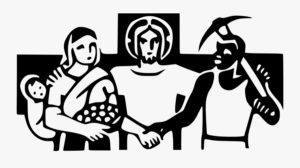Striking workers: hard left, Marxist, or Catholic?

Image: clipartkey.com
Source: Ekklesia
When the Archbishop of Canterbury condemned the Government's plan to send asylum seekers to Rwanda, a Conservative MP complained that it could make Conservative churchgoers, "feel alienated and unwelcome."
The Archbishop did not offer to dilute one of the key messages of the gospels to make Conservatives feel more comfortable, and as we enter a summer of strikes and strike ballots, there may be other politicians who find that their religion is at odds with their politics.
Prominent Catholics like Jacob Rees Mogg will no doubt, because of their political ideology, condemn striking workers. But Catholic Social Teaching (CST) is very strong in promoting the rights of workers to join a union, and to withdraw their labour in defence of jobs, pay and conditions.
Rather than respecting those rights, the Conservatives have been looking for ways to undermine them, including legislation to lift the ban on employing agency staff to replace striking workers.
This tendency to put obstacles in the way of the unions was addressed by Pope Benedict in his 2009 encyclical, Caritas in Veritate: "Through the combination of social and economic change, trade union organisations experience greater difficulty in carrying out their task of representing the interests of workers, partly because Governments, for reasons of economic utility, often limit the freedom or the negotiating capacity of labour unions. Hence traditional networks of solidarity have more and more obstacles to overcome. The repeated calls issued within the Church's social doctrine, beginning with Rerum Novarum, for the promotion of workers' associations that can defend their rights must therefore be honoured today even more than in the past."
The Church's teaching in this whole area of workers' rights is founded on two main fundamental principles. The first of these is the concept of 'the universal destination of goods' or 'the common use of goods'. This, says the Catechism is the belief that "The goods of creation are destined for the whole human race."
Everyone is entitled to their fair share of the goods of the earth, so it follows that all wages must be sufficient to allow people to secure this fair share - what they need for a dignified life.
As Pope Pius XI stated in Quadragesimo Anno in 1931: "To each, therefore, must be given his own share of goods, and the distribution of created goods, which, as every discerning person knows, is labouring today under the gravest evils due to the huge disparity between the few exceedingly rich and the unnumbered propertyless, must be effectively called back to and brought into conformity with the norms of the common good, that is, social justice".
Fifty years later in Laborem Exercens Pope John Paul II (credited by some with helping to bring down the Soviet Union, and certainly no Marxist) explained how this ideal should be achieved in a modern economy: "the justice of a socioeconomic system and, in each case, its just functioning, deserve in the final analysis to be evaluated by the way in which man's work is properly remunerated in the system. Here we return once more to the first principle of the whole ethical and social order, namely, the principle of the common use of goods. In every system, regardless of the fundamental relationships within it between capital and labour, wages, that is to say remuneration for work, are still a practical means whereby the vast majority of people can have access to those goods which are intended for common use: both the goods of nature and manufactured goods. Both kinds of goods become accessible to the worker through the wage which he receives as remuneration for his work. Hence, in every case, a just wage is the concrete means of verifying the justice of the whole socioeconomic system and, in any case, of checking that it is functioning justly. It is not the only means of checking, but it is a particularly important one and, in a sense, the key means."
The second of the fundamental principles on which the church's teaching is based is also expressed in Laborem Exercens - "the primacy of the person over things, and of human labour over capital".
As John Paul II explains: "Everything contained in the concept of capital in the strict sense is only a collection of things. Man, as the subject of work, and independently of the work that he does - man alone is a person. This truth has important and decisive consequences."
This truth means that employers have a responsibility to ensure that wages and conditions of employment enable workers to have a dignified and decent life. If employers fail in this responsibility, then this is where trade unions play a vital role. As Laborem Exercens says: "It is always to be hoped that, thanks to the work of their unions, workers will not only have more, but above all be more: in other words, that they will realise their humanity more fully in every respect."
Incidentally, hard-pressed parents may be interested to know that CST also maintains that one wage should be sufficient to sustain a family. The way this belief is expressed in Quadragesimo Anno, with the assumption that the wage earner will be a man, may seem old-fashioned and sexist: "In the first place, the worker must be paid a wage sufficient to support him and his family." Yet in the present day, when so many families struggle financially and single parents are so often in poverty, when childcare can be prohibitively expensive and exhausted parents feel there aren't enough hours in the day, the belief that one wage, (or two part-time ones, perhaps) should be sufficient to support a family in dignity is actually quite progressive, and would be life-enhancing for many adults and children.
So, according to Catholic Social Teaching, if workers in the UK cannot afford to heat and eat or pay their rent without getting into debt or using a foodbank, then that situation is, by definition, unjust.
Workers should first seek to remedy an unjust situation through negotiation, but if this cannot be done, then withdrawing their labour may be their only option. On strikes, the Compendium of the Social Doctrine of the Church says: "The Church's social doctrine recognises the legitimacy of striking "when it cannot be avoided, or at least when it is necessary to obtain a proportionate benefit", when every other method for the resolution of disputes has been ineffectual."
In a situation where many workers have seen their wages suppressed for years and the prices of essential goods are rising steeply, we have surely reached a situation where strikes are justified. And in the case of the rail strikes, due to government cuts, Network Rail plans to eliminate 2,500 safety critical maintenance jobs, so striking rail workers could be said to be protecting not just their own jobs and living standards, but wider public safety and the common good.
As corporate profits keep rising and both billionaires and foodbanks proliferate in the UK, Conservative politicians and much of the corporate media likes to label striking workers and union leaders 'hard left' or Marxist. Leaving aside the fact that 'hard left' is used to describe a politics which is mainstream in much of Europe, or the fact that a Marxist analysis of our current situation can be perfectly valid, perhaps we should point out that, whatever the strikers' political beliefs, their actions seem to be in accordance with Catholic Social Teaching.
Indeed, far from being a threat, trade unions are, says Laborem Exercens "a mouthpiece for the struggle for social justice".
© Bernadette Meaden has written about political, religious and social issues for some years, and is strongly influenced by Christian Socialism, liberation theology and the Catholic Worker movement. She is an Ekklesia associate and regular contributor. Her latest book is Illness, Disability and Caring: A Bible study for individuals and groups (DLT, 2020). Her latest articles can be found HERE. You can follow Bernadette on Twitter: @BernaMeaden


















